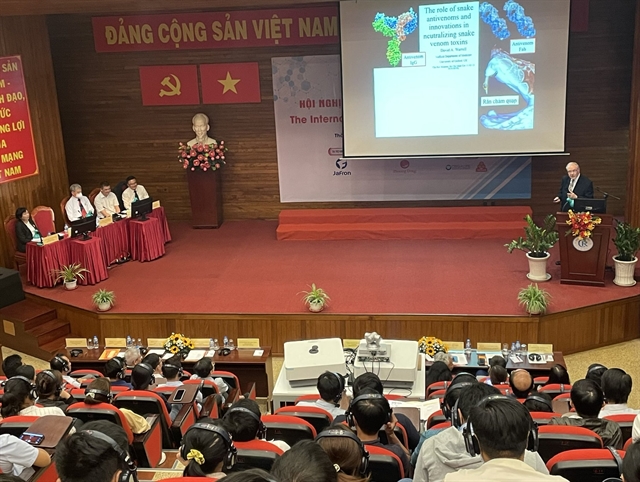 Society
Society

The incidence of acute poisoning has been on the rise over the past ten years, with many new types of poisoning agent reported, according to a survey conducted by Chợ Rẫy Hospital in HCM City.

|
| Participants at the international conference on toxicology held on Saturday (February 25) at Chợ Rẫy Hospital in HCM City. VNS Photo Thu Hằng |
HCM CITY — The incidence of acute poisoning has been on the rise over the past ten years, with many new types of poisoning agent reported, according to a survey conducted by Chợ Rẫy Hospital in HCM City.
The survey conducted at the hospital between 2010 and 2019 showed that toxicity from addictive drugs accounted for 12 per cent of fatal poisoning cases, followed by deaths from chemicals for plant protection at 10 per cent and alcohol poisonings at 8 per cent.
Poisoning by an unknown agent represented nearly eight per cent of the fatal cases over the period.
Food poisonings, chemical poisonings and poisonings caused by snake bites accounted for most poisoning cases that required hospitalisation.
The hospital offered treatment to a total of 14,294 patients with acute poisoning between 2010 and 2019. Of that figure, severe poison cases requiring intensive care accounted for half.
It currently receives around 1,500-2,000 patients a year compared to 800-1,000 patients a year over the past ten years.
The number of hospitalised patients for treatment of acute poisoning has been steadily increasing with many new types of poisoning agent reported, said Dr. Lê Quốc Hùng, head of the hospital’s Tropical Disease Department.
The mortality rate due to poisoning by an unknown agent remained high partly due to limitations in testing and diagnosis, said Hùng, who is also head of the hospital’s intensive care and poison control unit, at an international conference on toxicology held on Saturday (February 25) in HCM City.
A shortage of many antidotes that are scarce and a lack of physicians in toxicology are among obstacles to diagnosis and treatment of poisoning, he said.
An absence of poison control departments or units at most of medical facilities and lack of toxicology testing equipment have left many poison cases undetected.
International cooperation in training and scientific research in poison control remains modest, he added.
The international conference on toxicology was aimed at strengthening national coordination in poison control and bolstering international cooperation in scientific research with poison centres in the world. —VNS




